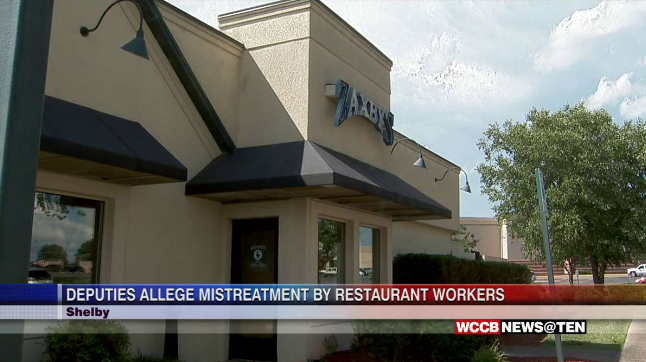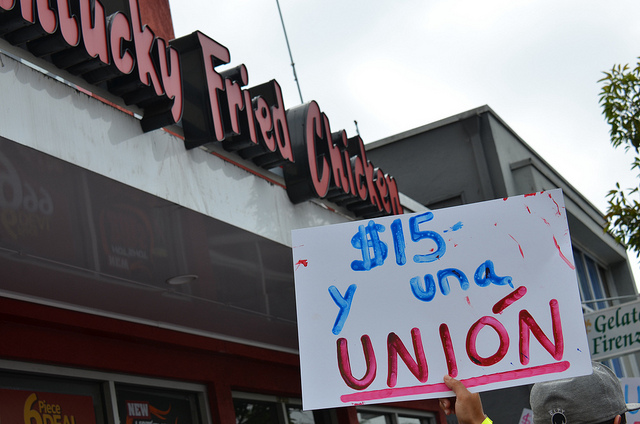Text by Sol Weiner
As anybody who’s turned on a television or opened a newspaper lately could tell you, this summer has been a political circus. Although they only registered as tiny blips on the vast radar of the 24-hour news cycle, there were at least two notable instances this summer of North Carolina food and politics intersecting in some very interesting ways.
Though the first case actually took place in Virginia, it involves our beloved Cook Out, so naturally it’s included. In June, two women headed home from a Trump rally, sporting Trump shirts and “Make America Great Again” hats, were refused service at a Cookout in Colonial Heights, Virginia. The staff laughed at and generally teased the women before the two eventually cancelled their orders and called corporate headquarters. The women were, as my dad would say, not mad, just disappointed. “You should not be discriminated based on who you support,” said one of the women, “whether it be Bernie, Hillary or Mr. Trump.”
![Shannon Riggs (left) and Lauren Wolfrey at the Cook Out. According to Wolfrey, "Once you witness [discrimination] first hand, it's a totally different experience. I was in a state of shock." (Source: http://wtvr.com/2016/06/13/trump-supporters-cook-out/)](https://www.ncfolk.org/wp-content/uploads/2016/08/Trump-Women.png)
Both groups were shocked—or at least feigned shock—upon finding out that their food couldn’t be separated from politics, and that they couldn’t expect workers who serve them to be opinion-less robots. In the former case, the women were appalled to learn that their political beliefs, and the way they performed them in public, were subject to public comment. In the case of the latter, the officers were upset that they didn’t receive the respect they thought they deserved.

At first glance, the politics of the police and the brand of electoral politics that Donald Trump represents seem unrelated to fast food work. At the end of the day, most news outlets attributed the tampered food and poor customer service to individual preferences—these people like Donald Trump, these people don’t; these people think the police are necessary, these people mock them. After all, what do trade deals, national security, and police violence have to do with burgers and fries?
In my opinion, everything. As a folklorist, I believe that it’s important to connect the stories that people tell each other about work with the concrete actions people take to participate in it, regulate it, and profit from it. Just as Donald Trump’s campaign didn’t emerge from a vacuum, and police departments have their own troubled legacies of violence, fast food restaurants are grounded in a history of struggles between labor and capital. They are affected by markets and legislation, just like banks, hospitals, and schools. It might do well for those fretting over these attacks on the American Way to attempt to go a little deeper and ask, why?
Then we have to listen. The best sources—be they newspaper articles, scholarly writings, or performance art—are based directly on workers’ experiences. Historian Robin D.G. Kelley has written extensively about the culture that service industry workers create amongst and for themselves. An integral part of that culture are the subtle ways that workers resist management and cope with stress: jokes, games, stories, and so forth. Folklorists have long insisted that we pay attention to the customs and culture people create, no matter how seemingly insignificant, as they speak deeply to who we are and who we want to be. Instead of giving into knee-jerk reactions and demanding that the people who serve us just serve us a little better, let’s try listening to the ways that we might actually serve them.

Here are some resources on the labor lore of fast-food and service-industry workers:
Fast Food Women (1992)
This classic documentary, produced by Anne Lewis Johnson, documents the lives of the predominantly middle-aged women in the fast-food industry in Eastern Kentucky.
“20 Year Anniversary Roundtable On Robin D. G. Kelley, Race Rebels: Author Interview.”
Robin Kelley discusses his book Race Rebels: Politics, Culture, and the Black Working Class and how James C. Scott’s idea of “weapons of the weak” inform cultural forms of the Black working class. Kelley delves into the connections between race, class, police violence, and resistance in the workplace.
Woes of a Fast Food Worker
http://woesofafastfoodworker.tumblr.com/
This blog is just one example of the ways that workers express themselves and their realities. Bonus points for highlighting the ways that resistance, social media, memes, and service-industry work intersect.
For link to Steve Rhodes’s photo license, click here.
Leave a Reply